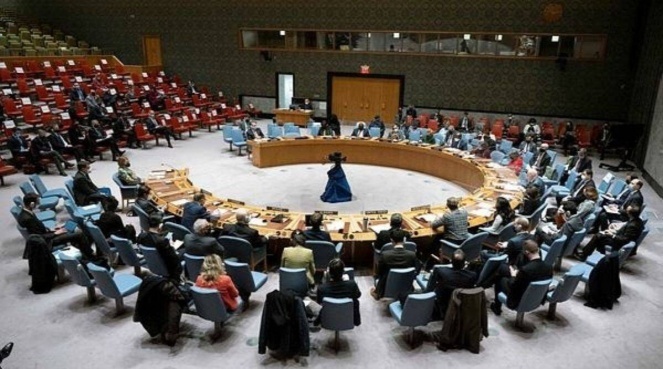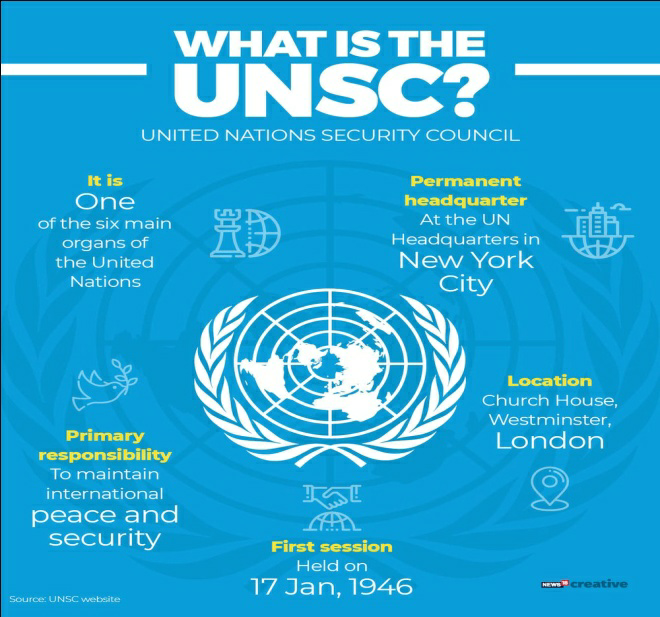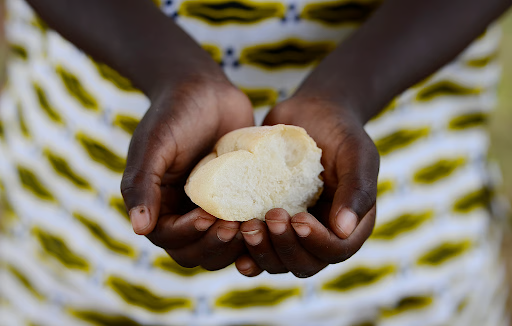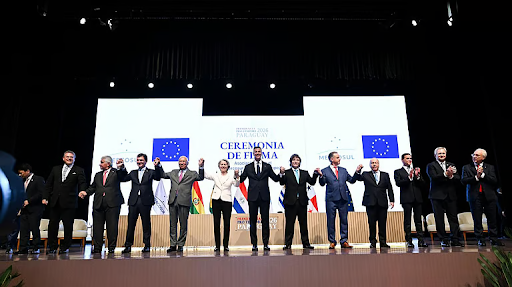Description

Copyright infringement is not intended
Context: The 15-nation Security Council met to hold the vote on the emergency special session of the 193-member General Assembly on Russia's invasion of Ukraine.
More about news:
- This comes after the Russian veto blocked a UNSC resolution on its "aggression" against Ukraine.
- India abstained from a procedural vote taken in the United Nations Security Council (UNSC) to call for a rare special emergency session of the UN General Assembly on Russia’s aggression against Ukraine.
- The resolution was adopted with 11 votes in favour, paving the way for the General Assembly to meet on the crisis.
- India, China and the UAE abstained, while Russia voted against the resolution.
- This will be only the 11th such emergency session of the General Assembly since 1950.

India at UNSC:
- India has recently taken over the presidency of the United Nations Security Council.
- India began its eighth term as a non-permanent memberof the UNSC on January 1 and will remain as such for a period of two years.
- India's bid for a permanent seat at the UN Security Council has support from four of the five P5 nations, namely the US, UK, France and Russia.
- China is the only permanent memberwhich is yet to officially back India's bid.
Composition of UN Security Council:
The UN Security Council is composed of
- 15 members, including five permanent member states - China, France, Russian Federation, the United States, and the United Kingdom - and
- 10 non-permanent member states elected by the United Nations General Assembly (UNGA).
- Each non-permanent member gets the opportunity to work as UNSC president.
- Ten non-permanent members are elected to the UNSC every year for a two-year term. India's current term began on January 1 of this year and will last until December 31, 2023.
- The 10 non-permanent seats are distributed among the regions of the world: five seats for African and Asian countries(three are for Africa and two for Asia), one for Eastern European countries, two for Latin American and Caribbean countries, and the remaining two for Western European and other countries.
- The Africa and Asia Pacific group takes turns every two years to put up an Arab candidate.
How does presidency of UNSC rotate?
- Each non-permanent member gets the opportunity to operate as president of the UN Security Councilduring the two years it is part of the grouping.
- The presidency of UNSC changes hands every month between its membersin the English alphabetical order of the member states' names.
- In August, the presidency was passed on from France to India. Similarly, Ireland is slated to take over the presidency from India in September.
- India will be in line for the presidency again in December 2022.
- The country's last term as a non-permanent member of the UNSC was in 2011-12, which was preceded by stints in 1991-92, 1984-85, 1977-78, 1972-73, 1967-68, and 1950-51.
Powers of the UNSC President:
- The presidency derives responsibility from the Provisional Rules of Procedure of the United Nations Security Councilas well as UNSC's practice.
- The holder of the presidency is considered to be the 'face' and spokesperson of the UNSC.
Responsibilities of the UNSC president include:
- Calling meetings of the UN Security Council
- Appealing to parties in a conflict to "exercise restraint"
- Reading statements of the UN Security Council to the press
- Approving provisional agenda (proposed by the secretary-general)
- Presiding at UNSC meetings and deciding questions relating to policy and overseeing any crisis
Veto power of UNSC member states:
- The UN defines 'veto' as a "special voting power", which provides that "if any one of the five permanent members cast a negative vote in (UNSC), the resolution or decision would not be approved".
- However, the "veto power" is restricted to P5 member states of the UN Security Council. Non-permanent members of the UNSC do not enjoy this privilege.
- Article 27 of the UN Charter says each member of the UNSC shall have one vote and that decisions on "procedural matters" shall require no more than the affirmative vote of nine out of the 15 members.
- Decisions on any other matter need not only an affirmative vote of nine members but also the concurring votes of the permanent members.
United Nations General Assembly (UNGA):
- It is one of the six principal organs of the United Nations (UN).
- It serves as the main deliberative, policymaking, and representative organ of the UN.
- Its powers, composition, functions, and procedures are set out in Chapter IV of the United Nations Charter.
- The UNGA is responsible for the UN budget, appointing the non-permanent members to the Security Council, appointing the Secretary-General of the United Nations, receiving reports from other parts of the UN system, and making recommendations through resolutions.
- It also establishes numerous subsidiary organs to advance or assist in its broad mandate.
- The UNGA is the only UN organ wherein all member states have equal representation.
- It can reconvene for special and emergency special sessions.
- Voting in the General Assembly on certain important questions—namely recommendations on peace and security; budgetary concerns; and the election, admission, suspension or expulsion of members—is by a two-thirds majority of those present and voting. Other questions are decided by a simple majority. Each member country has one vote.
- Apart from the approval of budgetary matters, including the adoption of a scale of assessment, Assembly resolutions are not binding on the members.
- All 193 members of the United Nations are members of the General Assembly, with the addition of Holy See and Palestine as observer states.
https://indianexpress.com/article/world/india-abstains-from-unsc-procedural-vote-to-call-for-general-assembly-session-on-ukraine-7793999/








